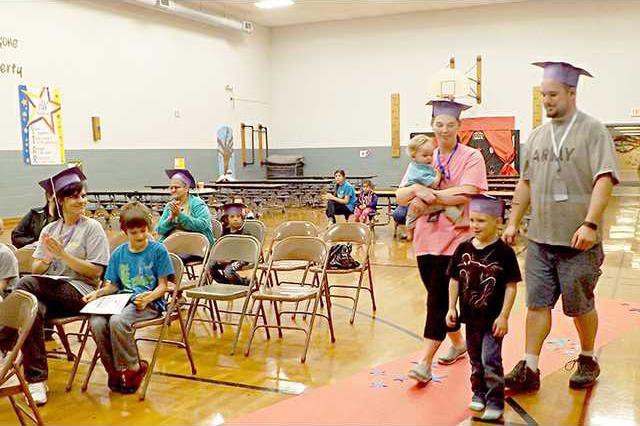A graduation and awards ceremony of sorts took place last week at Eisenhower Elementary School. The caps were made of purple paper, and the red “carpet” that graduates walked was also paper.
Parents and children were celebrating the culmination of eight weeks of LIFE classes, where they learned about Literacy Integrated Family Engagement. Similar courses are offered at other Great Bend schools to parents of children in the Kansas Reading Roadmap program.
KRR is a statewide project of the Kansas Department for Children and Families, working in partnership with the Kansas Department of Education to improve third-grade reading scores. It combines extra instruction time with family oriented programs, which have been shown to help students who struggle with reading. The program is being evaluated by the University of Kansas Center for Public Research.
Cindy Sandy at Eisenhower School said parent-partners from the community and third-grade teacher Jodi Shumacher helped lead the program there.
Each week, parents and children shared an evening meal at the school and then participated in activities designed to strengthen parent-child bonds and family communication. Last Thursday, past graduates joined the families just finishing the program for a pot-luck meal. After dinner, the children went to a classroom while the parents met in the library to talk about what changes they’ve made because of this program.
A parent from last year’s program recalled how Jane Heeke, one of the group leaders, had the children serve the adults at an evening meal. “That was wonderful,” she said, Since then, her family has added “family time” and assigned chores to its own dinners.
“Family meal time together is kind of a lost thing,” Heeke said. But it can open the door to improved communication. One rule is to turn off the television and electronic devices.
“We have a lot more conversations now,” another parent said. She used to keep busy in the kitchen during meal time, but found face-to-face connections prompt children to open up and talk.
Other parents liked reading a book with their children or playing a game during classes.
“We really liked the doodle pages,” one parent said. In that activity, everyone turned a scribble on a piece of paper into a drawing and explained what it was. “You got see what your kids are thinking and what they’re interested in.”
A grandmother in the group said she now plays a card game with her granddaughter before bedtime. Timed right, it has reduced bed-time hassles. “A few minutes of face-to-face time ‘resets’ her.”
“One of our first discussions was about discipline,” Heeke said. “Can you see where these things can help? It’s building security and trust in a child; having stability helps with behaviors. If bedtime is the only time you spend with them, they’ll make bedtime a battle. Once we treat children with respect, the respect comes back.”
Heeke congratulated the families on giving up their evenings for the past eight weeks.
“Good for you,” she said. “You took the time – you could have done something else on Thursday nights.”
In some families, fun things only happen on weekends, but fun family nights during the week can be fit into any busy schedule, she said. For these families, now that the LIFE classes are over, they have an extra two hours a week to make it happen.
The families also formed bonds with each other during the eight weeks together. This will continue with planned gatherings such as barbecues or bowling.
Students look back on LIFE
Family classes part of Kansas Reading Roadmap





